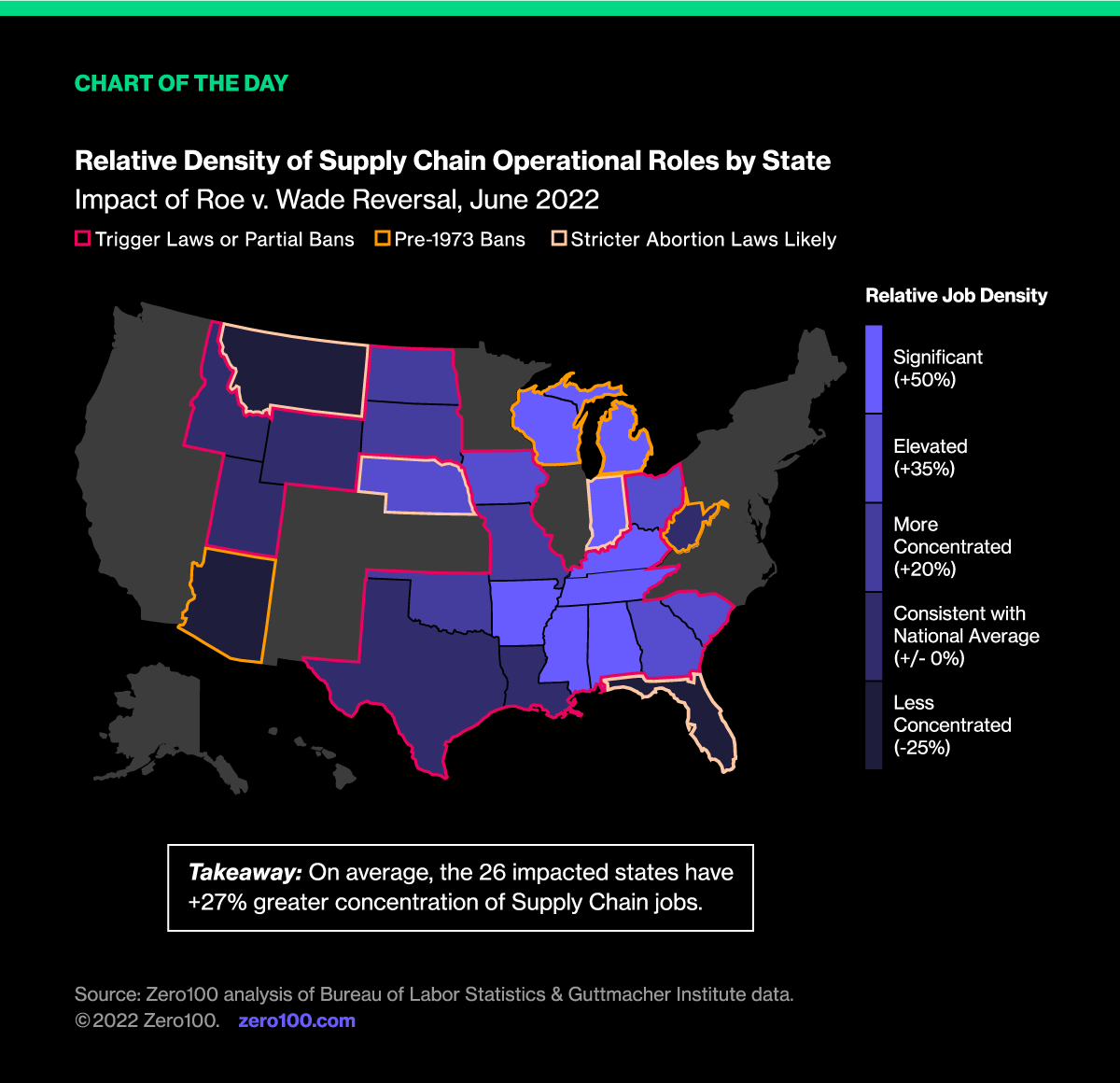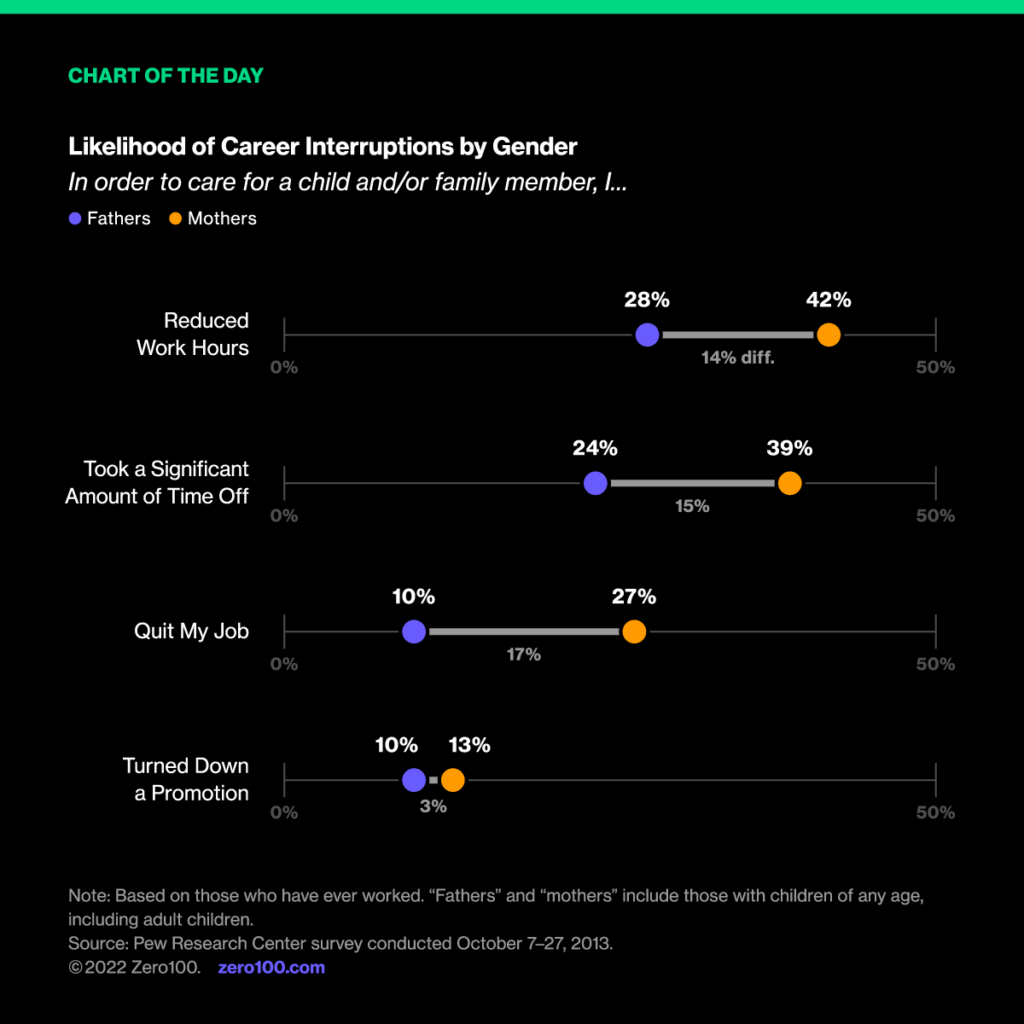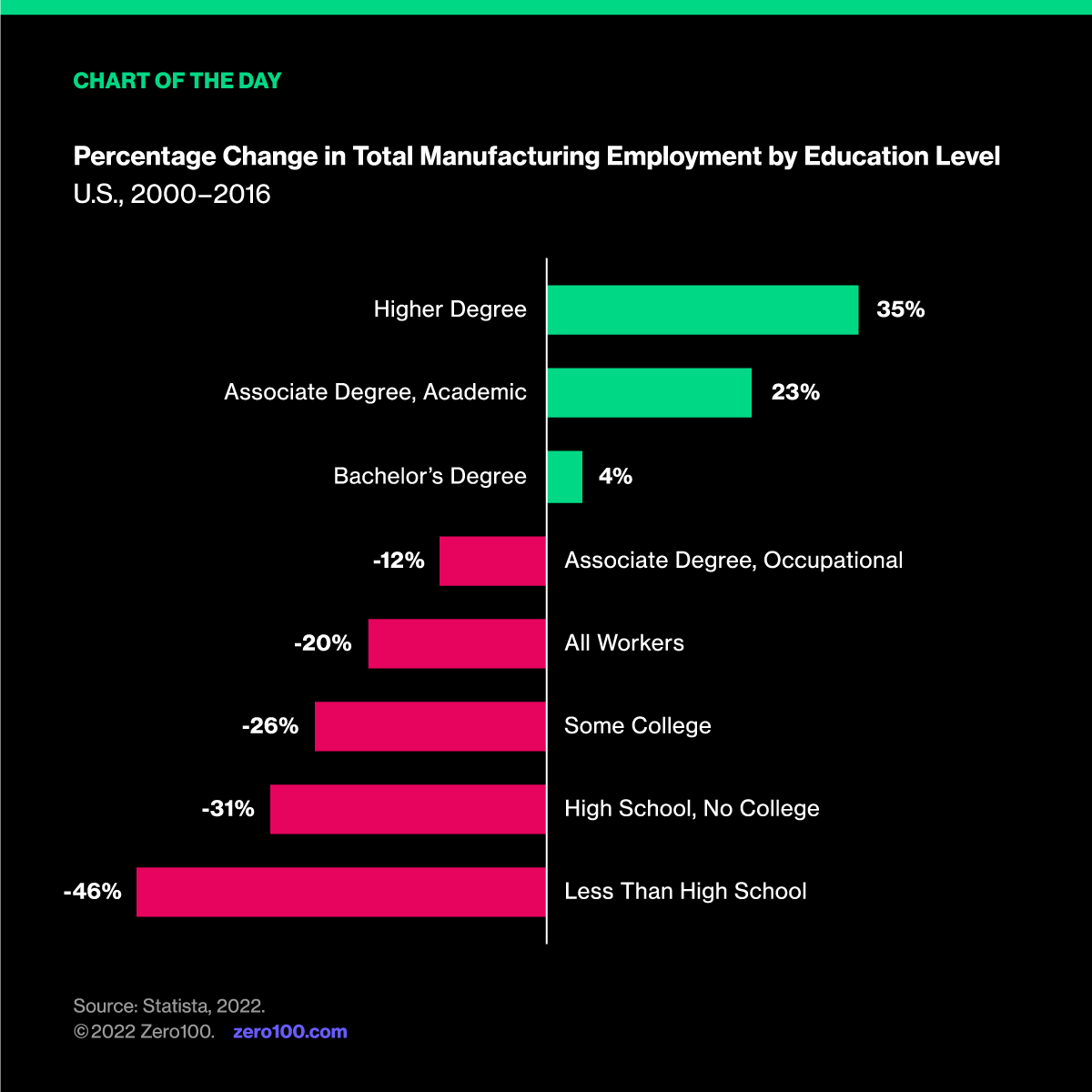At Zero100, we see the world through a supply chain lens – a lens that zeroes in on the intersection of ESG, people, and digital and what it means for supply chain. We say we are mobilizing a radically new and diverse community of global operations leaders and their teams, and that we aim to inspire a new generation of supply chain leaders. In the context of the overturning of Roe v. Wade, this means focusing in on the social and people aspects of our supply chains.
Those familiar with our organization know that we have a lot of opinions. But this isn't about opinions – this is about the data. Since the leaked decision in early May, we have delved into the existing research to explore the relationship between access to abortion and supply chain. And we don't find any established perspective on what this might mean for our supply chains and for the people we impact. This highlights what we hear from our members: that Zero100 is carving out a space to address an unmet need across the supply chain community, and tackling issues that others aren't.
We analyzed the news coverage to watch for early indications of impact on supply chain (like calling out potential to impact the location of distribution centers) and as executives engage through formal statements and personal LinkedIn accounts. We analyzed our own perspectives on gender equity in supply chain and studied all the data we could find from academia to the Bureau of Labor Statistics.
We find three themes that, taken separately, might be overlooked. Taken together, we see an impact on supply chains operating in the US and the extent of that impact differs based on geographic location. The three themes are: (1) the location dependency of some supply chain professionals, (2) the importance of retention in creating resilient supply chains, and (3) the role of unions.
This week, we put aside our usual bold perspectives and quippy musings. Instead, we share with you the data, and invite an open dialogue.
Location (In)Dependence of Supply Chain Professionals
In ongoing discussions within the Zero100 community, a topic that comes up a lot is talent and skills. These discussions take a dual lens to explore both the supply chain talent that works in locations like production and logistics, and the supply chain talent that works on laptops. This translates into an employee experience that's based on the dependence or independence they have from a specific working location. This classification doesn't necessarily correlate to pay. An entry level Buyer (location-independent) might make about $40,000 a year while a mid-level Production Manager (location-dependent) could make $120,000 a year.
When considering the impacts of the overturning of Roe v. Wade, location (in)dependence matters for the supply chain professional, and for their organization.
The decisions made (often by location-independent supply chain professionals) based on the results of well-thought-out network designs with a zillion calculations determine the physical locations of our supply chain networks, and where location-dependent supply chain professionals will work, including factories, fulfilment centers, cross docks and repair depots.

When looking at the data of the location dependency of supply chain professionals in the states that are immediately impacted by the Roe v. Wade overturn vs the unimpacted states, we find a higher density of location-dependent supply chain professionals working in impacted states. Impacted states have a 27% higher density of location-dependent supply chain professionals which means that more families, communities, and economies are built around these location-dependent supply chain professionals, when compared to the national average.
Location-dependency is the first reason we find that the overturning of Roe v. Wade impacts supply chain professionals more than it impacts other business functions, because the decisions we make about our networks have a material impact on the professionals working in them.
Resilience Means Retaining the Supply Chain Professional
This discussion comes at a time when resilience is top of mind for supply chain leaders. At our recent Zero100 Forum, the community discussed resilience and the future of work, and retention was a hot topic. We heard from supply chain leaders that retaining location-independent supply chain professionals is not really the issue; it's the location-dependent professionals that want a change.
The work-from-home-to-reduce-the-spread movement over the last two years worked fine for the location-independent. And for the location-dependent, it has inspired a search for higher flexibility found by moving to an office job. Of those that choose to make the leap, 80% are successful.
Resilience shines a light on retention and the employee experience.
Roe v. Wade, of course, is not just a women's issue. Nearly half of pregnancies in America are unintended and while a woman that gets pregnant may be a supply chain professional – she may also be sister, wife, daughter, partner, mother, or aunt of one of our supply chain employees.
Pew Research shows that children change how parents interact with the workplace:

While the intent of this graph is to show the inequity between fathers and mothers, through our supply chain lens we see all supply chain professionals impacted – and a change for those professionals and their organizations. This data shows a reduction in working hours and the possibility of a lost employee, regardless of the gender of the parent.
The data also shows that in the US, mothers and fathers make less money. While the reduction for fathers is small, the reduction for mothers is sizeable – they make 40% less. Women are also 36% more likely to have a second job – but make less with their two jobs than men do with one. This means that a woman in a location-dependent job (or jobs) doesn't have the disposable income to spend on benefits not provided by her organization. This adds up to a risk for retention.
The goal of resilience is the second reason we find that the overturning of Roe v. Wade impacts supply chain professionals – because retention is critical for resilience, and retention is at risk for the location-dependent supply chain professionals who are especially concentrated in states that are immediately impacted by the overturning of Roe v. Wade.
Unions May Play a Role for the Supply Chain Professional
In trying to make sense of the supply chain impacts, one headline caught our attention. The International Longshore and Warehouse Union takes a side. So does the American Federation of Labor and Congress of Industrial Organizations, the Service Employees International Union and several other unions – although they are not supply chain specific.
Unions have caught our attention a lot lately. The playbook on unions is different today than they were 60 years ago. In 1965, American approval of labor unions was at an all-time high of 71%, and these days it's 68% which is the highest it's been since 1965.
The individuals who are catalyzing the formation of unions have also changed. These days, it's recent college grads. In the last few years, an interesting trend has happened: more women than men are graduating from college.
The basis of recent union demands is to get a living wage and better benefits – like paid sick leave. The demographic of location-dependent supply chain professionals has changed in the last 20 years. There has been a 35% increase in manufacturing professionals with higher education.

Here's where the data comes together. The location-dependent supply chain professionals that work in the states immediately impacted by the overturning of Roe v. Wade make 10% less than their peers in non-impacted states. And women make less than men do – yes, those same women that are graduating from university and forming unions.
Your team isn't unionized? Consider your outsourced operations, their footprint, and the supply chain professionals that you impact.
The role of unions is the third reason we find that the overturning of Roe v. Wade impacts supply chain professionals. The data points toward union activity for the employees of supply chains and their outsourced partners.
An Invitation to an Open Dialogue
As we look ahead at pending or potential legislation that intersects with our supply chain lens of digital, ESG, and people, we see more changes coming in multiple countries. While the world changes around us, supply chain professionals continue to imagine what's possible and make it happen.
An open dialogue with each other around topics that impact our operations and our teams – even around topics as uncomfortable and important as abortion – means finding a path forward on the issues we do agree on, like taking care of our people and the planet in a time when resilience is the name of the game.
